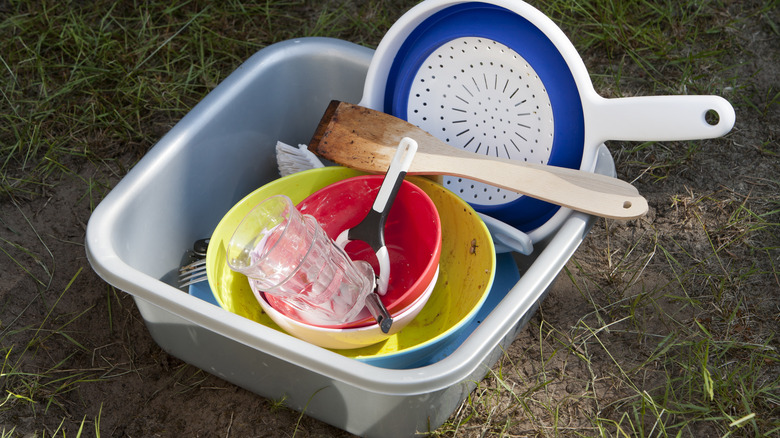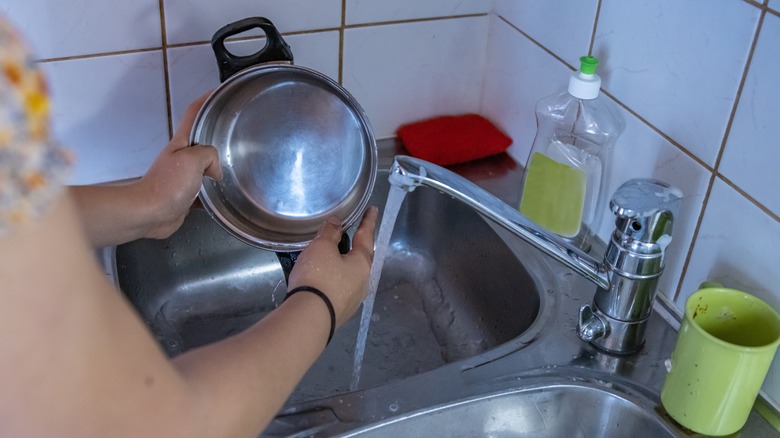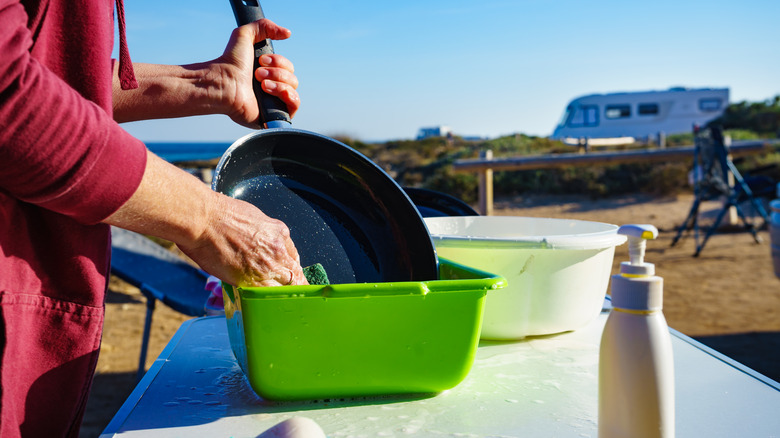Why You Need To Think Twice Before Washing Dishes In The Bathroom Sink While Camping
For most travelers, camping is all about getting back to nature and reconnecting with a simpler, more laidback way of life. From pitching a tent to roasting marshmallows, booking a camping adventure is synonymous with outdoor fun — especially if you're well-versed in the art of outdoor living. However, much like with any travel experience, there are certain unspoken rules and etiquette that come with camping — some of which might not seem obvious at first.
Whether it's researching different ways to be respectful when sharing a campsite, going through a checklist of everything you need to do before leaving your site, or learning the ins and outs of the seven principles of "Leave No Trace," proper camping etiquette is crucial for everyone's enjoyment. But with all the advice and guidelines out there, it can be overwhelming knowing where to even start.
Luckily, there's a very simple way to make your and your camp-neighbors' lives just a little easier during your next overnight trip: Keep those dirty dishes far, far away from the bathroom sinks. After all, although it might seem tempting to wash off the remnants of last night's fireside mac and cheese in there, the truth is ... those sinks just aren't built to handle the gunk and food waste. And you really don't want to be the person known for clogging the campsite sinks, do you?
Campsite bathroom sinks aren't built for that
While it might seem tempting to wash your dishes in the campsite's bathroom sink, this choice can create more problems than it solves. After all, these sinks are primarily designed for basic hand and teeth washing — not for handling food waste, heavy grime, or even grease from dirty dishes. Failing to respect their intended use — and going all out washing your entire cookware in them — can quickly lead to clogs and backups, as well as inconvenience for other campers and potentially expensive repairs for the campsite itself.
On top of that, from a hygiene perspective, washing dishes where others brush their teeth and wash their hands is just plain ol' unsanitary. In fact, this practice can quickly spread bacteria and create unpleasant smells in shared facilities — which, let's face it, no one wants to deal with. Moreover, food residue in bathroom sinks can attract pests and wildlife, creating a potentially dangerous situation for everyone — human and animal — involved. Lastly, the products you use for your dish-washing needs can also end up being harmful to the local environment, especially if the soapy water manages to make its way into the groundwater system through bathroom drains.
How to clean your dishes when camping
Since the bathroom sink is off limits, you might be wondering what to do with all the dirty dishes and pans sitting idly by your campsite. The answer? You can still wash them! You just need to get a little creative. Before you start scrubbing, set up two bins — these will be your washing stations. Fill the first one with warm soapy water for washing and the second with clean water for rinsing. From there, grab your dishes and make sure you scrape off any leftovers into a separate plastic container or bag. This will significantly reduce cleaning time, keep your water bins cleaner, and allow you to dispose of food particles securely where they won't attract animals.
Moving on, start washing your dishes from "cleanest" to "dirtiest" by dunking each item in the soapy water, giving it a good scrub, and then sinking it into the second container for a rinse. Once you're done, lay your items out to air dry, or use a clean microfiber towel to wipe them down if you don't have enough time.
Once you've finished, it's time to responsibly dispose of your wastewater. To do so, make sure you strain out any remaining food particles and throw them in with your other trash. Then, take your graywater and follow campsite disposal instructions, if available. If not, simply "broadcast" the water — a fancy term for spreading it out over a wide area — as far from your campsite and other natural water sources as possible.


